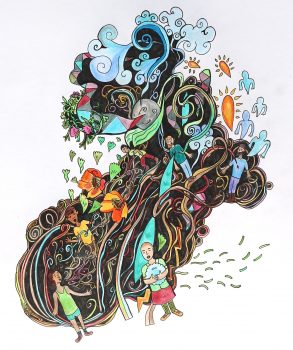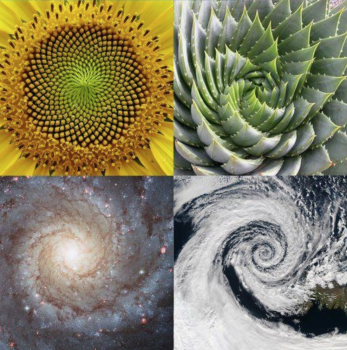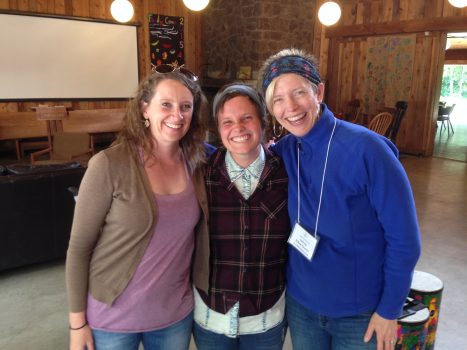“What We Pay Attention to Grows”: EcoFaith Recovery Internship as a Fractal for Healing
Wild, turbulent waters again surround us after the last weeks’ events at Charlottesville and White Supremacist protests all around the country. The Spirit stirs within us and demands action. Yet, nothing that is presented to us feels like it touches the deep, raging space that aches in our fearful guts. We pick a variety of criticism flowers on the internet: bits and pieces of analysis that shut down every single one of the courses of action that we dream up. We donate to the bail funds, we write our own angry or galvanizing Facebook post, then slip into an illness of inaction. Despair lurks in the corners. The EcoFaith song “Yes yes yes, but how? Yes yes yes,” threatens to become “No no no, not now. No no no.”
What do we do?
I am no stranger to the craving for criticism. Someone telling me that I am doing it wrong lets me off the hook, lets me say, “See, I’m not cut out to be a leader, to have a voice. If I can’t do it all perfectly, I should not do it at all.” In June, I gave a presentation at the Eco-Reformation Institute about the land’s story and our story, how a path towards healing necessitates truth-telling about the legacies of ecocide, genocide and abuse by which not one of our places or bodies is left untouched. After stepping into my courage, that growing edge of leadership development, I waited to hear the negative feedback that would let me give up so I didn’t have to hold this brave, dangerous, uncomfortable space again.
Like many of who grew up white, middle class, female, I was taught that perfection was possible and was expected of me. Perfectionism, this symptom of whiteness and privilege, is no friend of recovery. We do not get to be perfect in this work. We do get to be creative, to experiment, to grow.
White supremacy, grossly illuminated by the light of torch-wielding crowd, is extraction capitalism’s brother. Systems of power want to stay in power so they can go on exploiting, abusing, traumatizing. These woven threads of destruction are easy to see in a place like Duluth, MN, where the proposed Line 3 Pipeline threatens to further decimate the lives, water, and cultural practices of Anishinaabe people. Of course, this pipeline threatens the lives and water of all who live here, but it is the Anishinaabe who both have the most to lose and the most to give in imagining a different way.
I believe that the EcoFaith Practices also lend us tools for a different way. In movement moments, when tensions are high and everyone’s hurt, anger, and trauma raises to the surface, it is so common to experience in-fighting with the folks who are standing next to us. As I experienced my own frustration with the lack of communication skills around pain and fear, I had to ask myself, why on earth should I expect people to be good at communicating needs and differences in our worst spaces when we have so little practice talking about the hard, messy stuff when we are at our best?
I have been drawing a lot of life from adrienne maree brown, a queer Black Detroit-based facilitator for environmental, gender, and economic justice. With a self-proclaimed crush on biomimicry and permaculture, adrienne draws from the natural world for models of organizing with wonder. I will be quoting abundantly from her book “emergent strategy” for the rest of this blog post.
“Humans so far have generally deified and aligned with the “king” of the jungle or forest—lions, tigers, bears. And yet so many of these creatures, for all their isolated ferocity and alpha power, are going extinct. While a major cause of that extinction is our human impact, there is something to be said for adaption, the adaption of small, collaborative species. Roaches and ants and deer and fungi and bacteria and viruses and bamboo and eucalyptus and squirrels and vultures and mice and mosquitos and dandelions and so many other collaborative life forms continue to proliferate, survive, grow. Sustain… How do we turn our collective full-bodied intelligence towards collaboration, if that is the way we will survive? Species only survive if they learn to be in community.”
Community grows as we invest in the relationships around us. Organizing tuned in to critical relationship, rather than critical mass, requires us to tune in deeply to the people (and plants, and animals, and rivers) with whom we work with in order to survive. Showing up, repenting of white supremacy, recovering from disconnection and disempowerment means “going deeper, being more vulnerable and more empathetic.”
I am trying to awaken my own spiritual leadership in this way. As a millennial doing this work, I have a complicated relationship with Facebook. I have seen it be used as a powerful tool of connection in the movements, a place where rage can be expressed and respected, and support can be shared across geographic difference. However, one of my biggest concerns with Facebook is that it is a-contextual and assumes that there is one, best, right, lion of an answer, when really what we need is dandelion and mushroom solutions which look different from place to place, community to community. My facebook feed is filled with competitive performative-allyship that distracts from relational transformation. Yet, there is so much privilege in shutting off social media entirely, and I thought—how do I do my part to transform this Facebook space so that deeper relationship has a place here, even in my one corner, or wall?
Thus, a few weeks ago, I put out a call encouraging people to spend time with one another and offering myself as a sounding board, a discernment partner in one-to-one phone calls for folks trying to wade through what their own next step would be. Since posting, I have had six people take me up on it. These have been amazing, in-depth conversations with people that I admire showing up in diverse, thoughtful ways. They have been heartbreaking conversations as well. The words and feelings and actions of my community (which is widespread) have sustained me as I work to wade through the next steps with my community in Duluth.
Following the fractal patterns in nature (also known as the Fibonacci sequence) shows us that “what we practice at the small scale sets the patterns for the whole system.”
This way of thinking, so captivatingly spelled out by adrienne maree brown, has been giving me life in these last few months of my EcoFaith Internship. In the last articulation of the EcoFaith Recovery Practices, Rhythms of Engagement encouraged biomimicry, setting our lives to the patterns of nature so that our work would be more grounded and sustainable. These rhythms have made their way into the very substance of the new practices, EcoFaith Recovery recognizes that healing has a rhythm, that balance is restored one fractal at a time.
I called my sister, JoAnna Wurst, the environmental scientist, to geek out about fractals from a different perspective. My sister and I often throw our theologian and scientist heads together around a problem. She talked of asters, the base of pinecones, nautical shells, and ferns unfurling saying, “Paying attention to patterns opens the door to magic. We don’t really understand the way nature works. As soon as you start focusing on nature, how the world works, you are going to see the patterns. Religion can get you there or chemistry can get you there. As long as you are deeply committing you are going to find your way.”
The Ecofaith Recovery Internship has been a space for me to slow down and really pay attention. My eyes and leadership skills are fresher for the time spent engaging the practices this year—and I feel more inspired than ever to keep going along this road of life: living alternatives and practicing justice. “The best criticism of the bad is the practice of the better.” (John 1:5) Adrienne maree brown invites us to “see our own lives and work and relationships as a front line, a first place we can practice justice, liberation, and alignment with each other and the planet.” An EcoFaith Recovery Internship makes it just a little easier to do that, and we all need people committed to transformational relationship now.
To sign up to receive these blog post directly to your email account, click here or on the link in the upper right sidebar of any page at ecofaithrecovery.org.
Please feel free to share this post with others and use the field below to post your thoughts on this topic. Thanks!



